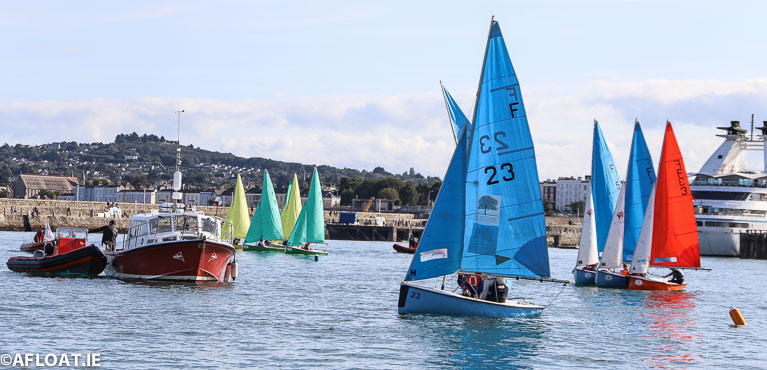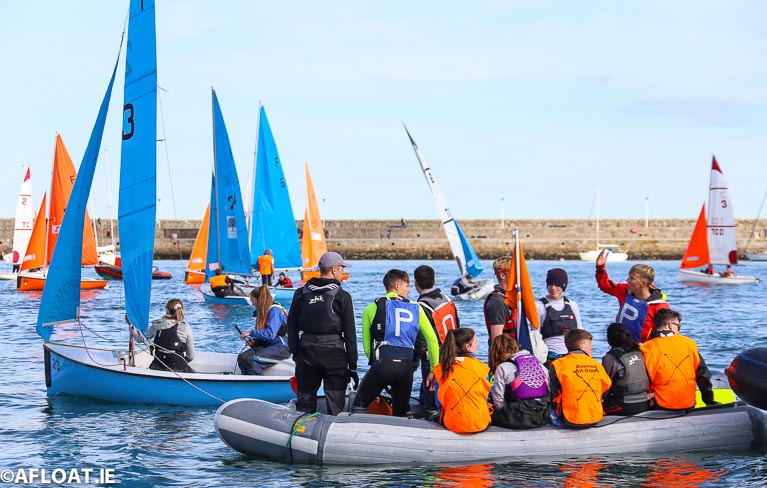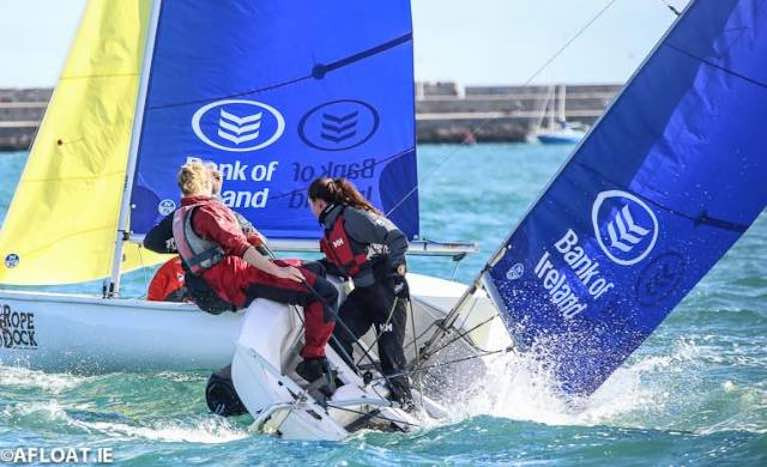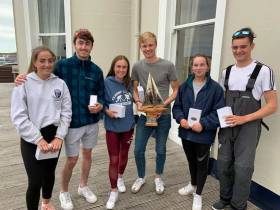Displaying items by tag: Elmo Cup
Training for Team Racing's Elmo Trophy Captured in Short Video
Royal St. George's Robert Walker shot this short timelapse video showing the training that is ongoing this week for the Elmo Cup team racing and the Dun Laoghaire Harbour granite pond venue looks superb in the August sunshine!
See the vid below
The Elmo Cup takes place on 27/28 August at the Royal Saint George.
As Afloat previously reported, this year sees the return of last year's debutants Glandore Harbour Yacht Club, as well as the first ever Donegal entry, Rathmullan Sailing Club.
The home club will look to defend the trophy after the success of ‘Sea Buoys’ last year as Afloat reported here.
The event will be sailed in three flights of Firefly dinghies, where teams of six crews will race each other in a round-robin format.
RStGYC currently have 30 teams in five flights entered with six in each team, so a total of 180 sailors aged between 12 and 18.
18 Teams Ready for 130 Races at RStGYC's Sixth Elmo Trophy
The full lineup of 18 teams will be ready to battle in Dun Laoghaire Harbour this weekend for the sixth Elmo Trophy.
This youth sailing team racing event will see teams of six sailors representing their clubs or classes race in the 18 Firefly dinghies that are supplied for the event.
The 108 competing sailors at the Royal St George Yacht Club are aged between 13 and 19 with a 50:50 split between boys and girls.
The team travelling the furthest is a first-time entry from Glandore Yacht Club skippered by Conor Cresswell, while one of the host teams will include a member of Liverpool's West Kirby Sailing Club.
On paper, very strong lineups are entered from Royal Cork skippered by Lola Kohl, National Yacht Club skippered by Natasha Hemeryck, the 29er class skippered by Trevor Bolger and the Waszp class skippered by Max Goodbody.
A host team skippered by Finn Walker will look to defend the trophy won last time by 'Curious George' in 2019.
Over 130 races are expected to be sailed with the final scheduled for Sunday afternoon.
Royal St George Yacht Club Cancels Elmo Trophy Team Racing Event at Dun Laoghaire Harbour
The 2020 Elmo trophy for team racing at Dun Laoghaire Harbour has been cancelled. With the current measures in place to halt the spread of the coronavirus event organisers RStGYC have made the difficult decision to cancel the event for 2020.
Unlike conventional fleet racing regattas, the Elmo Trophy sees groups of young sailors sharing Firefly dinghies, carrying out on-water changeovers using support RIBs and often being in close proximity to one another ashore.
It also requires a high number of support staff and volunteers, as well as attracting a large number of spectators to the club.
A postponement to October and a change in format to 2v2 Team racing was considered to enable the event to be sailed but with the recent rise in cases, the event has now had to be cancelled.
This year's event was to have seen the addition of the new ISA fleet of fireflies and the introduction of a Swiss league to ensure teams on similar standards continued to race against each other all weekend. Both of these would have helped build on last year's record entry of 22 teams and 4 flights of boats.
RStGYC looks forward to welcoming teams back in 2021.
'Curious George' Victorious at Fifth Elmo Trophy Youth Team Racing Event
"Curious George" from the host yacht club emerged the winners of the fifth Elmo Team Racing Trophy sailed this weekend at the Royal St George Yacht Club in Dun Laoghaire Harbour. 22 teams from all over Ireland competed in the event, with most of Ireland's top youth sailors enjoying sailing with and against each other in almost perfect team racing conditions.
Despite a slight delay waiting for wind on Sunday morning, the race team successfully completed almost 120 races over the two days.
 Almost 120 races took place over the two days
Almost 120 races took place over the two days
After the initial round-robin on Saturday, the teams were split into seeded fleets for racing on Sunday. Curious George (Toby Hudson Fowler, Kathy Kelly, Henry Higgins, Isabelle Kearney, Jack Fahy and Emily Riordan) narrowly beat Goats in Boats, led by last years winning captain, Tom Higgins. Showing the competitiveness of the sailing, and how our youth sailors are developing as keen team racers, the next three places had to be decided on count backs, with Morgan Lyttle's 420 Blaze it just edging ahead of George Clooney (captained by Helen O'Beirne) and Atlee Kohl's 3 Amigos. First in the Silver Fleet was Harry Twomey's RCYC team.
 22 teams from all over Ireland competed in the event
22 teams from all over Ireland competed in the event
Raced in four flights for the first time in its 5 year history, the organisers hope this event will grow to a fifth flight and even more teams next year as youth team racing grows around the country.

























































